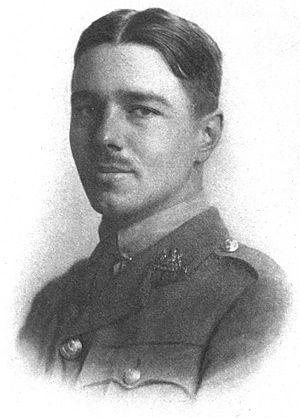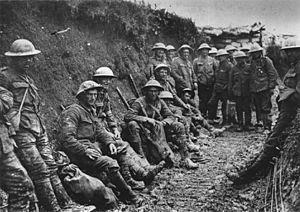Smile, Smile, Smile by Wilfred Owen facts for kids
"Smile, smile, smile" is a powerful poem by Wilfred Owen. Owen was an English poet and soldier who lived from 1893 to 1918. He became one of the most important poets of World War I. His poems often showed the terrible truth of fighting in the trenches and the dangers of gas attacks. His writing was greatly influenced by his friend and mentor, Siegfried Sassoon. Owen's poems were very different from what many people at the time thought about war. They also contrasted with the patriotic poems written by earlier poets like Rupert Brooke.
Contents
Understanding "Smile, Smile, Smile"
This poem shows the harsh reality of war for soldiers. It contrasts their suffering with how the public saw them. The poem highlights the difference between what was printed in newspapers and what soldiers truly felt.
The Poem's Words
Here is the poem "Smile, smile, smile" by Wilfred Owen:
Head to limp head, the sunk-eyed wounded scanned
Yesterday's Mail; the casualties (typed small)
And (large) Vast Booty from our Latest Haul.
Also, they read of Cheap Homes, not yet planned,
'For', said the paper, 'when this war is done
The men's first instincts will be making homes.
Meanwhile their foremost need is aerodromes,
It being certain war has but begun.
Peace would do wrong to our undying dead,
The sons we offered might regret they died
If we got nothing lasting in their stead.
We must be solidly indemnified.
Though all be worthy Victory which all bought,
We rulers sitting in this ancient spot
Would wrong our very selves if we forgot
The greatest glory will be theirs who fought,
Who kept this nation in integrity.'
Nation?---The half-limbed readers did not chafe
But smiled at one another curiously
Like secret men who know their secret safe.
(This is the thing they know and never speak,
That England one by one had fled to France,
Not many elsewhere now, save under France.)
Pictures of these broad smiles appear each week,
And people in whose voice real feeling rings
Say: How they smile! They're happy now, poor things.
What the Poem Means
The poem describes wounded soldiers reading a newspaper. The paper talks about war victories and future plans for homes. It also mentions that the war has just begun. The newspaper suggests that peace would be wrong because soldiers died for a cause. It says that the "greatest glory" belongs to those who fought.
However, the soldiers, who are injured, react differently. They don't get angry. Instead, they smile at each other in a strange way. This smile shows they know a secret truth that the public does not. The poem hints that England's soldiers are mostly fighting and dying in France. The public sees pictures of smiling soldiers and thinks they are happy. But the poem suggests these smiles hide a deeper, sadder truth about the war.
Who Was Wilfred Owen?
Wilfred Owen was born in 1893 in Oswestry, England. He grew up loving poetry and started writing at a young age. When World War I began, Owen joined the British Army in 1915. He became an officer and fought on the Western Front in France.
Owen's Experiences in War
Owen saw firsthand the terrible conditions of trench warfare. He experienced the mud, the cold, and the constant danger. He also witnessed the effects of gas attacks and the suffering of wounded soldiers. These experiences deeply affected him. They made him want to write poems that showed the true horrors of war.
Meeting Siegfried Sassoon
In 1917, Owen was sent to a hospital in Scotland. He was suffering from "shell shock," which is now known as PTSD. There, he met another famous war poet, Siegfried Sassoon. Sassoon encouraged Owen to keep writing. He also helped Owen develop his unique style of poetry. Sassoon's own poems were also very honest about the war.
Owen's Legacy
Wilfred Owen returned to the front lines in 1918. He was tragically killed in action just one week before the war ended. Even though he died young, his poems became very famous after his death. They are still studied today for their powerful messages about war and humanity. Owen's work helped change how people thought about soldiers and the sacrifices they made.
World War I: A Brief Look
World War I was a huge global conflict that lasted from 1914 to 1918. It involved many countries around the world. The war was fought mainly in Europe.
Life in the Trenches
Soldiers on the Western Front lived in long, narrow ditches called trenches. These trenches were often muddy, cold, and filled with rats. Life in the trenches was very difficult and dangerous. Soldiers faced constant threats from enemy fire and disease.
Gas Warfare
During World War I, new and terrible weapons were used. One of these was poison gas. Gas attacks caused severe injuries and often death. Soldiers had to wear gas masks to protect themselves. The use of gas added to the fear and suffering of the soldiers.



